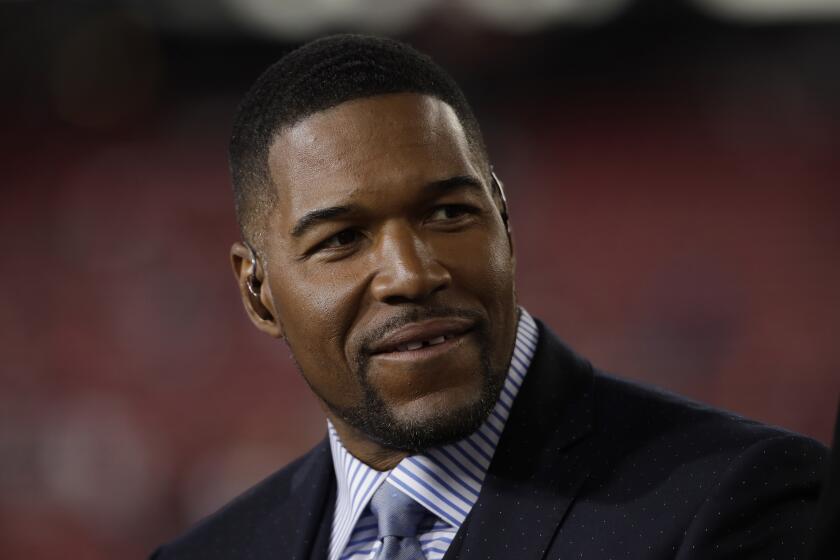Bronfman Deal for Warner Music Is Seen
Edgar Bronfman Jr., the former Seagram Co. chief, is expected to announce a final agreement today to buy Time Warner Inc.’s global music division for about $2.6 billion, sources said.
The sale would shift control of Warner Music, the world’s fourth-largest music conglomerate, to private hands and vault Bronfman back to his former status as a power in the record industry. It also would end Time Warner’s three-decade run as a dominant force in the music business.
Although sources cautioned that the deal could be delayed, they said Bronfman’s investment team and Time Warner spent Sunday hammering out details. Bronfman’s team in recent days had slightly increased its bid for the company’s recorded music and music publishing operations, apparently beating out a rival offer from British music giant EMI Group.
On Sunday, Bronfman’s bid hit an obstacle when a key partner, TV billionaire Haim Saban, pulled out amid questions over his management role in the venture, sources said. Late in the day, however, Saban reversed course and rejoined the bid. Initially, Saban committed an estimated $200 million to the package. Saban could not be reached for comment.
Any additional financing is expected to come from Bronfman or New York leveraged buyout firm Thomas H. Lee, the bid’s lead investor. If the deal is sealed, Bronfman is expected to become chairman of the new company, to be called Warner Music. Its board members probably would include Scott Sperling, managing director of Lee and a key player in assembling the deal, sources said.
Bronfman declined to comment.
EMI is expected to announce this morning a formal withdrawal of its bid, which would have paid Time Warner about $1 billion in cash for the music labels and as much as a 25% stake in the combined company. The move marks the London-based company’s third failed merger run since 2000, and it now faces the prospect of becoming the only publicly traded stand-alone music company in an industry beset by sagging sales and rampant piracy.
Time Warner Chairman Richard Parsons had been concerned that an EMI deal would risk being rejected by regulators, particularly with antitrust officials reviewing a proposed plan to join the recorded-music divisions of Sony Corp. and Bertelsmann at the same time.
The deal also signals a major shift for Time Warner, which once viewed ownership of music catalogs as a central piece of its strategy to sell cable and Internet subscriptions. The media conglomerate retains an option to repurchase about 15% of the music company at a discount in three years, sources said.
Bronfman reenters the music business at a difficult time. Global music sales still are declining, and the value of many record companies’ libraries may be permanently damaged. Vast archives of music now are housed on consumers’ personal computers, ready to be swapped or copied to a CD free, probably crimping future growth.
Many music executives see consolidation as a potential short-term cure, believing they can join with a partner and squeeze out cost savings by integrating their operations. Indeed, some analysts believed that a Warner Music tie-up with EMI could have resulted in savings of about $290 million.
Bronfman would have to reduce costs without the help of a corporate partner with duplicative jobs that could be cut.
But sources close to Bronfman, 48, scion of the Seagram liquor family -- and occasional songwriter -- said he believed that music sales basically had hit bottom and that Warner Music was a bargain. His thinking is that new licensed music services, such as Apple Computer Inc.’s iTunes, antipiracy technology and the threat of legal action against consumers who illegally copy music, will reverse sales declines and make music a robust industry again.
Bronfman also faces the prospect of competing against the company he built: industry leader Universal Music Group, now a unit of Vivendi Universal. After Bronfman bought control of Universal Studios parent MCA Inc. and its film and music divisions in 1995, he paid $10.4 billion to acquire music giant PolyGram. The combination created Universal Music, which now accounts for about 26% of global sales. Bronfman may resign from Vivendi’s board, sources said.
If he buys Warner Music, Bronfman will acquire one of the world’s richest music catalogs -- with artists ranging from Madonna and Eric Clapton to Kid Rock and Missy Elliott. The vast library was built since the 1960s by record industry legends such as Mo Ostin, Ahmet Ertegun and David Geffen.
Under Warner Music’s current chairman, Roger Ames, the labels have picked up steam this year in the U.S. market, the world’s biggest. The company jumped from fourth to third place among the five major record companies in sales of new releases, and last week captured two spots on Billboard’s top 10 with new CDs from Kid Rock and Josh Groban.
How much additional cost-cutting Warner Music can do is unclear. The company already has shed about 2,000 jobs in the last three years, and shifted another 5,500 off the payroll this year when Time Warner sold its CD and DVD-manufacturing operation for $1 billion to Cinram International Inc. Warner Music now has about 4,500 employees.
Overall, Warner Music’s revenue has fallen from $4 billion in 1998, the year before Napster arrived on the scene and created an endless appetite for free music, to an estimated $3 billion this year. In 1998 the music unit generated $493 million in EBITDA; this year it’s projected by Bear, Stearns & Co. to reach $200 million. EBITDA is a gauge of cash flow used by Wall Street and measures earnings before interest, taxes, depreciation and amortization.
Insiders have speculated that Bronfman would merge Warner Music’s East Coast-based labels, Atlantic and Elektra -- a move that has been rumored for years -- to balance against its main West Coast division and biggest label, Warner Bros. Records.
Bronfman also is hoping to be buoyed by sustained sales at the company’s Warner-Chappell music publishing arm, which owns an estimated 1 million song copyrights, including songs by Elton John and Led Zeppelin.
Although royalties from songs released on CDs have steadily declined along with the slump in album sales, Warner-Chappell continues to generate a fortune from licensing songs to film and TV. This year Bear Stearns estimates the unit will generate about $105 million in EBITDA on $450 million in sales.
*
Times staff writer Richard Verrier contributed to this report.
More to Read
The biggest entertainment stories
Get our big stories about Hollywood, film, television, music, arts, culture and more right in your inbox as soon as they publish.
You may occasionally receive promotional content from the Los Angeles Times.










